TODAY’S READING FROM THE OLD TESTAMENT- ESTHER 8:1-10:3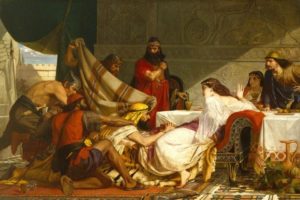
King Xerxes’ anger subsided when Haman was killed (Esther 7:10). What provoked his anger had more to do with Haman falling upon the Queen’s couch in an apparent assault upon her than it did the fact that Haman had ordered the annihilation of the Jews.
One Bible commentator, Karen H. Jobes (The NIV Application Commentary), points out the irony that Haman’s injured pride drove him to plot the destruction of Mordecai and the Jews, and the King’s injured pride drove him to execute Haman.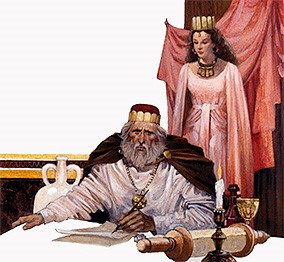
An Eastern custom is that the property of an executed traitor is confiscated and delivered to the King, or the one who was wronged by the traitor. King Xerxes gave the property belonging to Haman to Esther, because in his eyes, she had been wronged. Whereas the possessions of Haman are given to Esther, the former authority belonging to Haman is given by the King to Mordecai, the King’s savior. Esther, in turn, gives Mordecai what she has just received from the King of the authority and ownership of the former possessions of Haman. Whereas Esther was once an orphan receiving all wealth and empowerment from her cousin Mordecai, now Mordecai is receiving wealth and empowerment from Esther.
Esther pleads for the salvation of her people. However, all the power, authority and riches of this world cannot save a person from the irreversible law of death. Such is the law written in our humanity- the wages of sin is death. It is appointed for men once to die (Romans 6:23a, Hebrew 9:27)
However, Mordecai and Esther now have power and authority equal to that which was once held by Haman. They have the ability to write into law a decree that would counteract Haman’s decree, with equal, if not transcendent, force.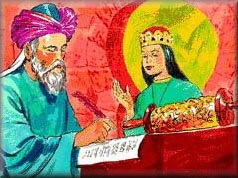
This reminds us that, in the hidden counsels of God, Christ having fulfilled the Law of righteousness and finished perfectly the work of redemption, was given all authority and power to counteract the law of sin and death written into the history of the old man, Adam. He satisfies the demands of the law of righteousness on our behalf, nailing to the cross the Adamic nature with its history of our sin that condemned us. He who fulfilled the law by putting the old man to death, now fulfills the law within us by giving us a new law- the gift of the Spirit, the operation of the law of the Spirit of life in Christ Jesus (Romans 8:2-3). The law that condemned us is fulfilled by the royal law of love (James 2:8). Against the perfections of Christ’s life- there is no law and no condemnation (Galatians 5:23; Romans 8:1). Jesus said, “A new commandment I give unto you that you love one another” (John 13:34-35). We can only love this way by the virtue and power of His indwelling life (Romans 5:5-10).
Whereas Haman’s decree authorized and empowered the Persians to slay the Jews, this decree authorized and empowered the Jews to defend themselves against those who would attempt to kill them.
Notice that Mordecai’s edict was proportionate to Haman’s, even in its wording. Haman had decreed that the citizens 1. Destroy 2. Kill and 3. Annihilate the Jews, both young and old, women and children and to 4. Plunder their property (Esther 3:13). Mordecai authorizes and empowers the Jews to stand against the scope of Haman’s edict, detail for detail. He gives the Jews the right to assemble and protect themselves to 1. Destroy 2. Kill and 3. Annihilate any armed force that might attack them and their women and children; and to 4. Plunder the property of their enemies.
What we find here may sound harsh, but it is a provisional law of just retribution. The Persians who attempt to kill the Jews on the 13th of Adar are the aggressors. The Jews are authorized and empowered to defend themselves to the same measure that they are being attacked.
When the day comes, they defend themselves against their attackers, but do not take their plunder (Esther 9:10,15-16).
The Jews rejoiced with celebration and feasting upon hearing of the new law, even though the actual day of battle was many months away.
Have you been counting how many feasts we have witnessed so far in the Book of Esther? This is the eighth (if we count the private meal of Haman and Xerxes in Esther 3:15) There are two more to go! (I list the feasts for you at the end of today’s entry).
Just days earlier Mordecai had been dressed in sackcloth and ashes and went through the city weeping and wailing. He could not enter the King’s gate or presence in that state. Now he is dressed in the finest of the King’s robes of blue and white, with a golden crown on his head and purple robe of fine linen. He is seen coming out from the King’s presence, authorized to make laws with the King’s ring. Instead of weeping and wailing throughout the Empire, there is shouting and rejoicing.
Notice what happened when Haman’s edict was published:
Esther 4:3 3 In each and every province where the command and decree of the king came, there was great mourning among the Jews, with fasting, weeping and wailing; and many lay on sackcloth and ashes.
Contrast this with what happens when Mordecai’s edict is published:
Esther 8:17 17 In each and every province and in each and every city, wherever the king’s commandment and his decree arrived, there was gladness and joy for the Jews, a feast and a holiday. And many among the peoples of the land became Jews, for the dread of the Jews had fallen on them.
Haman’s sudden demise, and Mordecai’s sudden rise to the highest office, did not go unnoticed by the general populace. The reversal was recognized as such a supernatural turn of events, that many people from other nationalities became Jews because ‘the fear of the Jews had seized them’ (8:17). (They possibly feared that the Jews would go on a rampage against all non-Jews and not just defend themselves from attackers, due to the marked rise of anti-Semitism in the land under Haman’s influence.)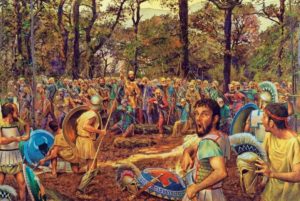
Chapter 9 describes the battle. The Jews defend themselves from those who were seeking their destruction. 500 men in Susa plus the 10 sons of Haman are killed. Ancient cultures recognized the threat that surviving family members of those who are killed often rise up to take vengeance. King Xerxes grants Esther’s request that the ten sons of Haman hang on the gallows as royal plea that the anti-Semitic attacks stop.
Mordecai records that a holiday be established in remembrance of the deliverance from the evil plot of the enemy.
Esther 9:24-26 24 For Haman the son of Hammedatha, the Agagite, the adversary of all the Jews, had schemed against the Jews to destroy them and had cast Pur, that is the lot, to disturb them and destroy them. 25 But when it came to the king’s attention, he commanded by letter that his wicked scheme which he had devised against the Jews, should return on his own head and that he and his sons should be hanged on the gallows. 26 Therefore they called these days Purim after the name of Pur. And because of the instructions in this letter, both what they had seen in this regard and what had happened to them,
Each year they were to celebrate these days in the month of Adar as days of feasting and joy and giving gifts to the poor.
The 10 Banquets:
- The King’s 180-day (6 month) banquet to display the glory of Persia’s wealth and power (Esther 1:1-4)
- The 7-day feast for all the people of Susa (Esther 1:5)
- Queen Vashti’s Feast (Esther 1:9)
- Esther’s Coronation Feast (Esther 2:18)
- Haman and King Xerxes have a private dinner as the Empire reels with confusion (Esther 3:15)
- Esther’s first banquet (Esther 5:5-8)
- Esther’s second banquet (Esther 6:14-7:9)
8.. The Good News of Mordecai’s exaltation and new commandment causes feasting and celebration (Esther 8:17)
- The day after the battle (the 14th of Adar) there is feasting and joy throughout the Empire
- All the people of Susa celebrate their victory on the 15th of Adar
The God who reveals His counsels, attributes and purposes in the scrolls, is the hidden hero of the Book of Esther (Hebrews 10:7).
Behind the scenes, God is at work, turning the tables and reversing the curse. With poetic justice, Haman is cast out of the highest office in the ‘paradisio’ of Susa, even as was Adam in the paradise of Eden. He is put to death on the very instrument he designed for Mordecai, even as the Serpent, Satan with the rule of sin, is put to death on the very cross he designed for the Son of God.
As Mordecai was raised from his humble state of sackcloth and exalted to the highest office in the Palace, Jesus is raised from his humiliation in death and is clothed in glory and honor to rule in such a way that the law is fulfilled. Those who once lived under condemnation and in the fear of death are now free to defeat their enemies. Thanks be to God who gives us the victory!
Chapter 10 of Esther foreshadows the authority, strength and greatness of this Greater Mordecai. A new man is on the throne. Reading this Book with new eyes, may we glorify our Lord Jesus Christ, the greater Esther, the greater Mordecai and the true King of Kings!
TODAY’S READING FROM THE NEW TESTAMENT – 1 CORINTHIANS 12:27-13:13
The Holy Spirit gave the gift of tongues (literally, ‘languages’) to the early church. In the contexts that we know of in the Bible, it is the ability to communicate in intelligible languages that the speaker has never before learned or spoken. And yet that language would be understood as the native language of its hearer. What a wonderful witness this was to the fact that God speaks every person’s heart language, and that the gospel is not bound to one particular language or culture.
The people who came from afar to Jerusalem for the Feast of Pentecost heard the praises of God proclaimed in their hometown dialects.
Acts 2:6 6 And when this sound occurred, the crowd came together, and were bewildered because each one of them was hearing them speak in his own language.
Paul gave instructions to the Corinthians as to how this gift would be used for building up believers in the local assemblies. Paul made it clear that by this time in the history of the church in Corinth, tongues were one of the lesser gifts and a sign for unbelievers, not believers (1 Cor 14:19-22). Some people believe that this gift has passed away completely. The Bible does not explicitly indicate that. It certainly was a permissible gift to be exercised by the Corinthian church at the time (1 Cor 14:39). Nor does the Bible teach that speaking in tongues is certain evidence of regeneration, sanctification, or being filled with the Spirit.
Speaking in ecstatic utterances was common in the pagan temples at Corinth, even as it is in cults today, such as Mormonism, Hinduism, the Way International etc.
In these matters, we adhere to what Scriptures make plain, and we cannot be dogmatic about what the Scriptures do not clearly teach.
TODAY’S READING FROM THE BOOK OF PSALMS – PSALMS 37:1-11
Don’t desire the lifestyle of those who are lost! Do not fret because of them! Do not be envious of their apparent success! Like green grass they will wither and die.
Instead:
- Trust in the Lord and do good (v.3)
- Delight yourself in the LORD; and He will give you the desires of your heart.
- Commit your way to the LORD, trust also in Him, and He will do it.
- Rest in the LORD and wait patiently for Him;
TODAY’S READING FROM THE BOOK OF PROVERBS – PROVERBS 21:23-24
Proverbs 21:23-24 23 He who guards his mouth and his tongue, guards his soul from troubles. 24 “Proud,” “Haughty,” “Scoffer,” are his names, who acts with insolent pride.
PRAY FOR THE NATIONS – MALAWI
Malawi
Republic of Malawi
Africa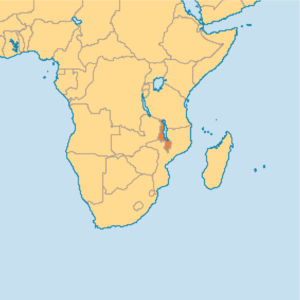
Geography
Area: 118,484 sq. km
Central African state extending along Lake Malawi and its outflow river, the Shire. A landlocked nation whose southern half is virtually an enclave within Mozambique.
Population: 15,691,784 Annual Growth: 2.82%
Capital: Lilongwe
Urbanites: 19.8%
HDI Rank: 160 of 182 (UN Human Development Reports 2009)
Peoples
Peoples: 33 (12% unreached) All peoples
Unreached Peoples Prayer Card
Official language: Chichewa and English Languages:24 All languages
Religion
Largest Religion: Christian
|
Religion |
|
Pop % |
Ann Gr |
|
11,925,756 |
76.00 |
3.0 |
|
|
3,069,243 |
19.6 |
2.9 |
Challenges for Prayer
Malawi faces serious challenges in the future, such as the combination of poverty, high population growth and increasing pressure on agricultural land. High levels of national debt, AIDS and unemployment, when added to the aforementioned economic factors, produce challenges that will require wisdom, long-term planning and proactive policies by the government. The grip of poverty hampers development not only in the financial sense but also in terms of education, AIDS prevention, family life and even effective ministry and discipleship. Pray for leaders in Malawi, most of whom are church members, to act with wisdom, humility and long-term planning on biblical principles.
Christian help ministries for prayer:
a) Bible translation. Completing the whole Bible in Lomwe and Chilambya is the next major challenge. The Yawo Bible will be finished in 2011. Several minority languages are without a NT and may need translations.
b) The Bible Society. There are great demands for Scripture for local use and for the refugee community – but limited funds to meet them. Many rural Christians have no Bibles. The Bible in audio format is a fast-developing ministry; Scriptures and/or teaching already exist in 26 languages (Bible Society, GRN, TWR).
c) Literature is much sought after, but expensive. Pray for an adequate supply of quality reading material for the literate, growing, but poor Church. The bulk of available literature includes secondhand Christian books in English and some locally published material.
d) Christian radio. The national broadcasting network regularly airs Christian programs. Local channel All Nations Radio covers half of the districts in the country. TWR now broadcasts 24/7 from Lilongwe along with six other private local Christian stations, including the African Bible College and FEBA.
PRAYER: Lord, God, You have proved throughout history that You are sovereign over all. What You have promised, we can be sure will come to pass. Your purposes cannot be thwarted. We know that You cause all things to work together for good to those who love You and are called according to Your purpose. The ‘poetic justice’ demonstrated in the Book of Esther in which the enemy , Haman, was destroyed on the instrument he designed for the destruction of the Promised Seed, gives us a prophetic picture of our deliverance through the work of Christ on the cross. Continually remind us of Your gospel of grace. Keep us from envying the prosperity of the wicked. Fill us with Your Spirit and a love for Your Word that our affections will be forever set upon You. In Jesus’ Name. Amen.
-Pastor David
